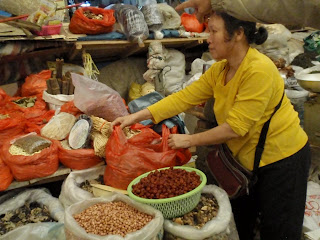Starting on 10/19-21/08
So now I'll tell you about what Leah won't, the non deluxe train trips. When we jumped the train in Datong, I let the CITS agent book the cheapest seat to Beijing with the balance of our ticket, hard seat.

After seeing the glazed tile nine dragon screen, we found one of the lesser temples under restoration. One quick loop through the grounds showed us a five dragon screen off the courtyard. We ran for the train to find that hard seat means "with humanity one rides". There were about 180 of us on the carriage. Two manly young men helped boost our 75 + pound bags to the upper rack; then we sat and sat. I bought pomegranate from the aisle vendor and watched the landscape. We then got a new seat mate who didn't have much to say, but was photogenic.

He wore the typical ass out romper for toilet training, but we did not buy him. At the next stop 70 more people were added to the aisle. They had purchased tickets with no assigned seats simply to return for the work week in Beijing. Leah was not well for this.
We spend two days in Beijing shipping heavy clothes used in Mongolia and enjoy some of the simple life of the park and the hutong.


I arrive only slightly worse for the wear. Buying milk on the way to the hotel, a grandmother at a stand tries to charge me 5 Y, for being western. I drop the pouch, back off from the stall. Her ever weary 50 something son sighs at his mother and sells it to me for 2 Y. Gotta watch those elders. I convence them we need to check in at 9 AM. Leah takes a spa day. Our respective Xian posts are earlier in the blog.



























